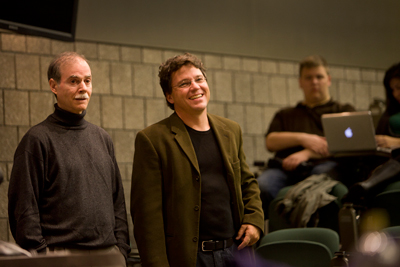'University Courses' cut across college lines to promote 'one university'
By Susan S. Lang

Cornell, with its seven undergraduate colleges and 80 majors from apparel design to engineering physics, can seem like as many separate schools. But a new initiative cuts across college lines to give students an experience of Cornell as "one university."
"University Courses," all taught by distinguished faculty and most cross-listed in at least two colleges, draw upon longstanding faculty interest in interdisciplinary study and collaborative teaching. The courses are intended not only to highlight Cornell's distinctive character but also to provide students with a cross-disciplinary learning experience, said Laura Brown, vice provost for undergraduate education and the John Wendell Anderson Professor of English.
Students with peers from across the university who enroll in these non-required courses will "bridge distances among our distinct colleges and schools, and provide at least one academic context in which students and faculty can experience Cornell as 'one university,'" Brown added.
The initiative, said Brown, is in response to the "one Cornell" idea in the university's strategic plan that calls for the university to create a common academic experience for Cornell undergraduates. "It draws upon and supports faculty who engage broad student interest across the campus," she said.
This year, three courses are offered each semester (with plans for potentially six per semester). The fall courses are:
- Plagues and People, taught by Laura Harrington;
- Six Pretty Good Books, co-taught by Steve Ceci, Jeff Hancock and Jeff Cowie; and
- Survey of American Film, taught by Sabine Haenni.
Spring 2012 University Courses will be:
- Introduction to Human-Environment Relations, taught by Gary Evans;
- Personalized Genomics and Medicine: Why Should You Care About What's in Your Genes? taught by Charles Aquadro and Spencer Wells, director of the National Geographic Society Genographic Project; and
- Ethical Issues in Health and Medicine, taught by Stephen Hilgartner.
Each of these courses, explained Brown, "provides students with examples of intersections, disjunctions or creative tensions among disciplines." They also, "provide models for intellectual discovery and critical thinking; introduce students to intriguing, possibly controversial topics; expose them to open dialogue or debate; and provide occasions for engaged and proactive pedagogy."
In other words, Brown stressed, while the courses are not part of "core curricula," they all support the universitywide educational goals of critical thinking and "engagement in the process of discovery or creation.
Applying for University Course designation
The program invites proposals from faculty that their courses, which can be of any size and at any undergraduate level, be designated a University Course. The courses can be existing courses or pilots. The program seeks courses that involve interdepartmental collaboration between two or more faculty members or between faculty members and campus or community resources.
Proposals are due Nov. 28 to the University Courses Advisory Board, c/o Office of the Vice Provost for Undergraduate Education, 433 Day Hall.
The University Courses initiative is administered by an advisory group of representatives from each undergraduate college and various units (including New Student Programs, the John S. Knight Institute for Writing in the Disciplines and the Center for Teaching Excellence) and the Council of Instructors, the group of current University Course instructors.
Since "pedagogical innovation" is a core priority of the University Courses initiative, Elliot Shapiro, co-director of the Writing in the Majors program, serves as the initiative's director of instruction. He works closely with the Council of Instructors to support new-course design and to help connect with instructional support units and programs including the Center for Teaching Excellence, library instructional programs and academic technology services.
"The initiative intends to recognize innovative instructors and highlight their contributions to undergraduate education," said Shapiro. "We support collaboration among faculty and academic staff across programs, departments and colleges."
Get Cornell news delivered right to your inbox.
Subscribe